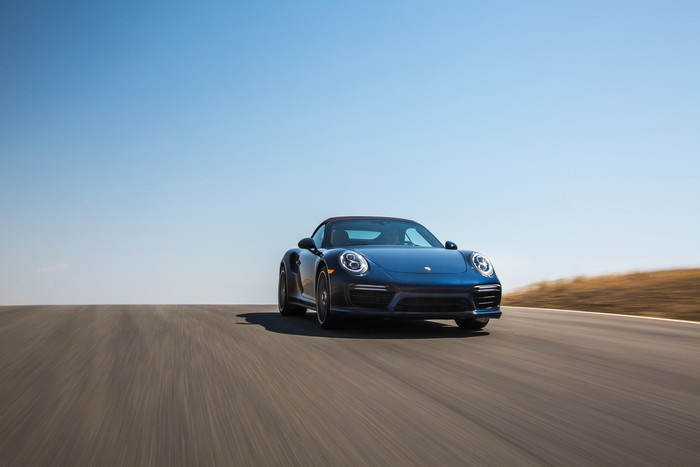
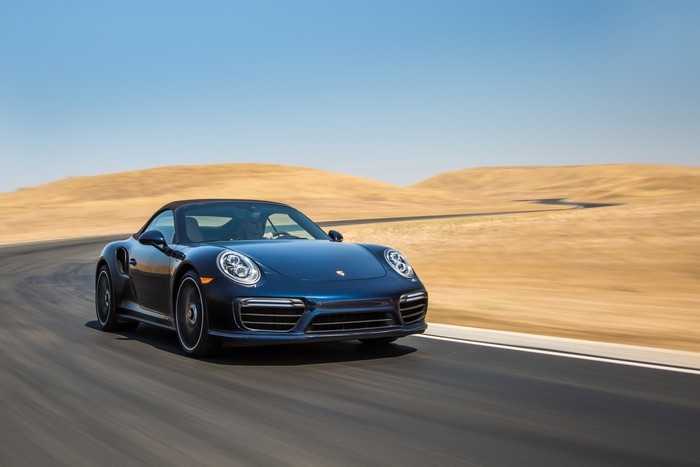
2018 Porsche 911 Turbo Cabriolet
Situated at the pinnacle of Porsche's 911 Cabriolet range is the Turbo, a sophisticated grand-touring roadster that delivers copious amounts of luxury and performance. It's offered in "standard” Turbo and extra-strength Turbo S forms, the latter of which produces 560 horsepower and is capable of rocketing from zero-to-60 mph in just three seconds.
For buyers who don't need the wind-in-your-hair experience, Porsche also sells the Turbo in fixed-roof Coupe form.
Overview
As with every Turbo Cabriolet since the original 1987 model, the latest generation is distinguished from other 911 drop-tops by a pronounced "whale tail” rear spoiler and curvaceous, extra-wide rear fenders. But don't let the familiar styling fool you - an impressive amount of 21st-century engineering lies under the sheet metal.
For starters, there's the Turbo's namesake, a 3.8-liter flat-six that is augmented by twin variable-vane turbochargers that run 14.5 psi of boost. In standard form, this formidable powerplant cranks out 540 horsepower and 523 pound-feet of torque.
Step up to the Turbo S, which increases boost to 17.4 psi and comes standard with the Sport Chrono package, and output surges to 580 horsepower and 553 pound-feet of torque.
Power is put to the ground with the help of Porsche's ultra-quick seven-speed "PDK” dual-clutch automatic gearbox - a traditional manual transmission is no longer offered - and an all-wheel-drive system with an electro-hydraulic multi-plate center coupling that apportions torque between the front and rear axles as driving conditions require.
Porsche claims a blistering zero-to-60 mph acceleration time of 3.0 seconds for the Turbo, and 3.1 seconds for the Turbo with Sport Chrono. The Turbo S is said to require just 2.9 seconds to do the deed. As impressive as those numbers are, if Porsche's past performance estimates are anything to go by, they're likely conservative.
For all that performance, fuel economy is still respectable, coming in at 19/24 mpg city/highway for both Turbo and Turbo S variants.
The tech edge
Of course, the Turbo's technology extends far beyond the engine bay. All models are equipped with a four-wheel steering system that enables extra-nimble responses at lower speeds in addition to heightened stability at highway velocities. Also improving stability is the Active Aerodynamics system, which progressively deploys front and rear spoilers as the speedometer needle creeps up, providing up to 309 pounds of downforce.
Optional on the Turbo and standard on the Turbo S is the Porsche Active Suspension Management System (PASM), which brings a lowered ride height and electronically adjustable dampers with a choice of sport modes.
The Sport Chrono Package adds a third mode - "Sport Plus” - as well as stability-enhancing dynamic engine mounts and a combination digital/analog stopwatch mounted atop the dashboard. In additional, manual transmission models get rev-matched downshifts, while PDK-equipped cars receive launch control.
Porsche Dynamic Chassis Control (PDCC) - again, optional on the Turbo, standard on the Turbo S- includes an electrohydraulic anti-roll system that effectively eliminates body roll.
A brake-based torque vectoring system adds an electronic rear differential, which applies the inside rear brake to ensure neutral handling in turns.
Porsche Carbon Ceramic Composite Brakes (PCCB) significantly reduce brake fade and also trim stopping distances.
Finally, Power Steering Plus adds a variable steering system that adjusts effort based on vehicle velocity - reducing effort at parking lot speeds and increasing it on the highway.
The inside story
Luxury sedan-grade materials and design characterize the cabin, with a nearly unlimited range of options - including extended leather, several seat designs, numerous colors and aluminum, carbon fiber and wood trims - available to suit the buyer's taste. Accouterments such as heated/ventilated seats, a heated steering wheel and a high-end Burmester sound system are also available to please sybarites.
A sloping center console marks a departure from previous Turbos, bringing an elegant look and a more convenient gear lever location at the expensive of a somewhat more constricted cabin feel. Still, space and comfort are in ample supply for the front seat passengers; the tiny, vestigial rear seats remain most useful as a supplement to the 5.1-cubic-foot front trunk.
Uniquely, the Turbo's fully power-operated convertible top contains magnesium panels that reduce wind noise, improve insulation and offer extra theft protection. The setup takes just 13 seconds to lower, an operation that can be performed on the move at speeds of up to 31 mph. A fully electronic wind deflector can be raised at the touch of a button to keep wind buffeting to a minimum.
Standard and optional features
The Turbo is fitted as standard with a navigation system with a seven-inch display screen, a 12-speaker Bose AM/FM/CD stereo with USB and AUX inputs, leather upholstery, Bluetooth connectivity, adaptive bi-xenon headlights heated exterior mirrors and 20-inch alloy wheels.
The Turbo S adds extra power, PASM, PDCC, PCCB, the Sport Chrono package, all-LED headlights, automatic high-beams, 14-way power-adjustable front sport seats and carbon-fiber interior trim.
Most of the Turbo S' equipment can be added to the standard Turbo.
Options include heated and ventilated front seats, a heated steering wheel, adaptive cruise control, a 12-speaker Burmester premium sound system, front and rear parking sensors, a sunroof and several alternate wheel designs.
Occupant safety
All Turbo Cabriolet models are fitted as standard with dual front, front side and front knee airbags in addition to traction and stability control systems.
Available as an option is a forward collision warning and mitigation system. It warns the driver in the event of an impending collision and, if necessary, can apply the brakes to prevent or mitigate the severity of a crash.
Key competitors
A number of worthy rivals vie to steal buyers' affections away from the 911 Turbo. These include the sleek Audi R8 Spyder, the Mercedes-AMG GT Roadster, and even the Lamborghini Huracan LP580-2 Spyder.
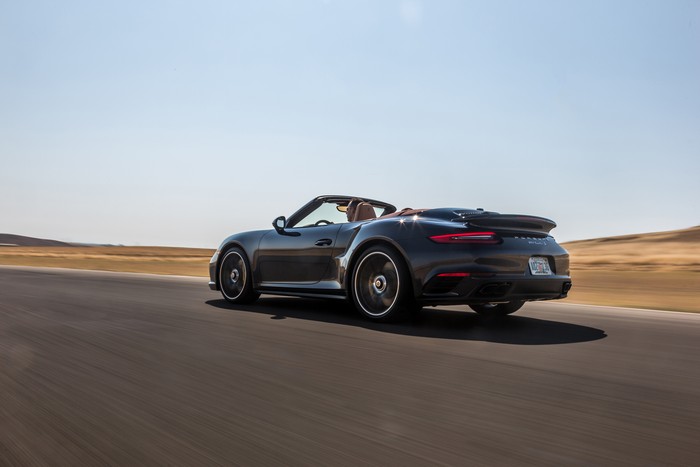
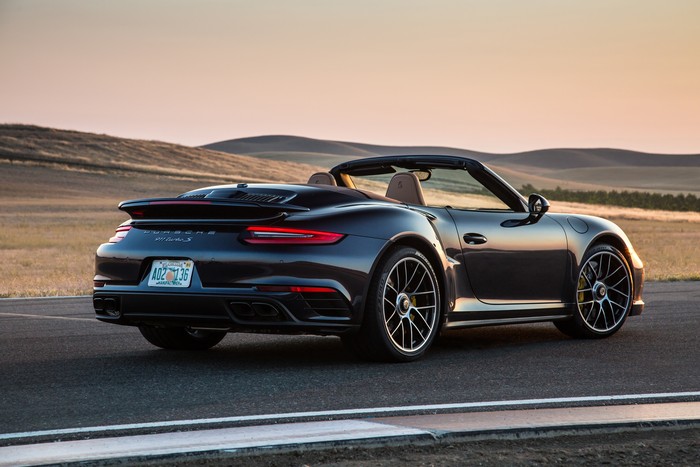
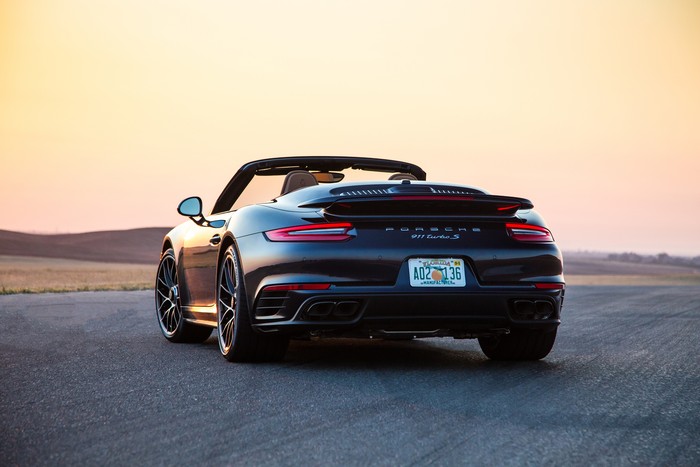
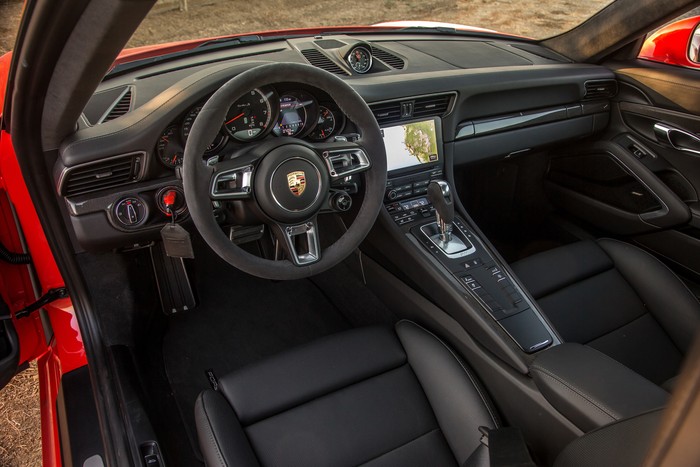
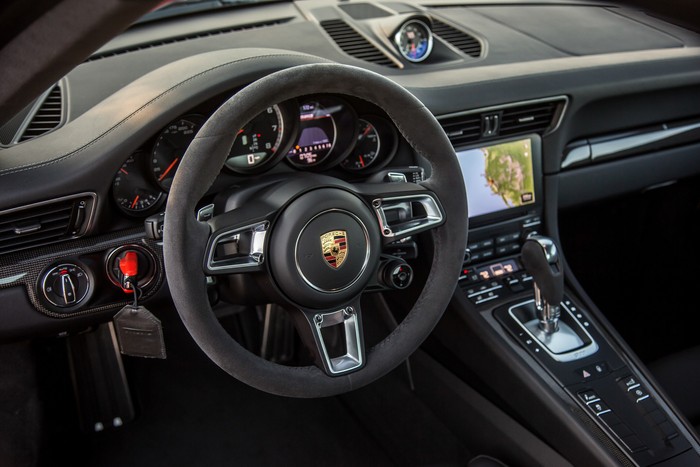
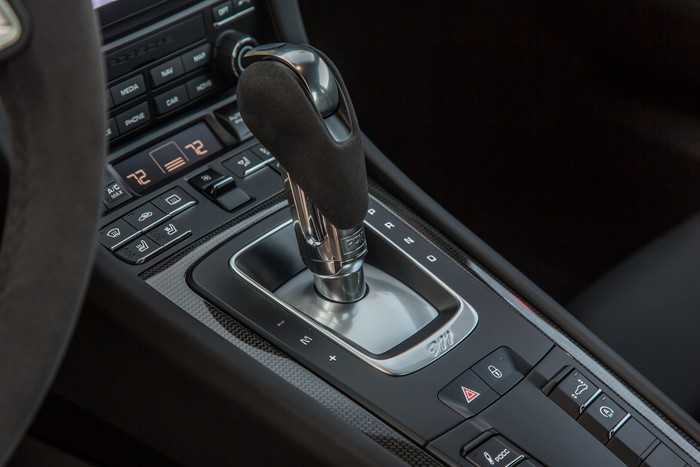

- Propulsion: Gas 3.8L Flat 6
- Power: 540hp
@
6400rpm - Torque: 486ft⋅lb
@
1950-5000rpm - Mileage: 21 MPG ( 19 city, 24 hwy)
- Transmission: 7-speed Manual
- Seating: 4 seats
in
2 rows - Passenger Volume: TBDcu ft
- Length: 177.4in
- Wheelbase: 96.5in
- Height: 50.9in
- Weight: 3671lbs
- Cargo Volume: 4.1cu ft
- Front Leg Room: TBDin
- Front Head Room: TBDin
- Front Hip Room: TBDin
- Rear Leg Room: TBDin
- Rear Head Room: TBDin
- Rear Hip Room: TBDin
- Drag Coefficient: TBD
- Drag Coefficient: 0.32